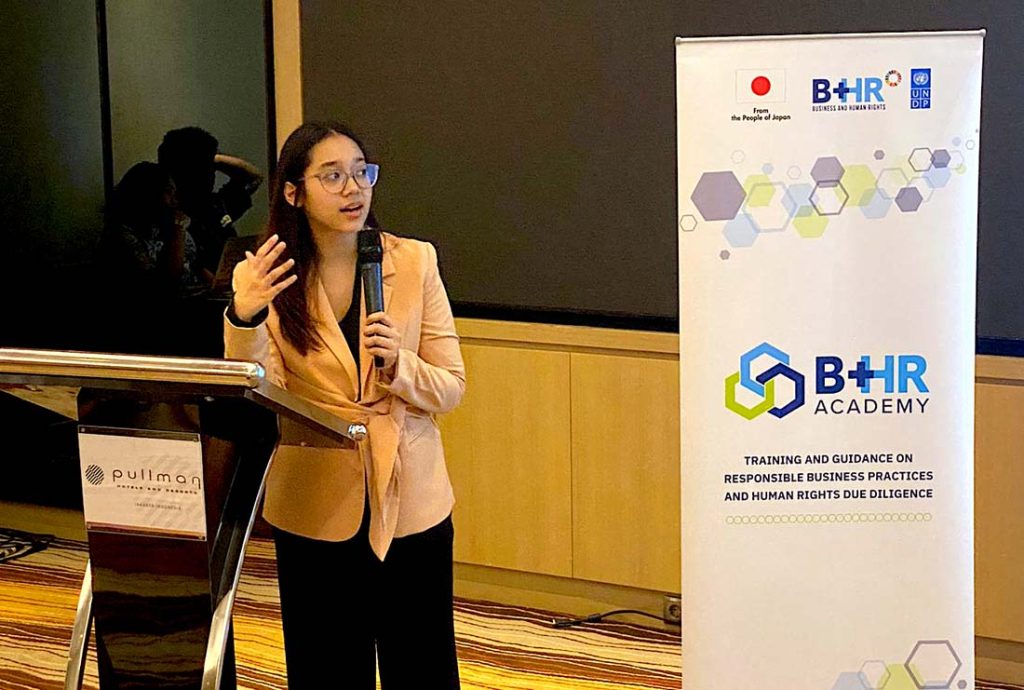Ms Tequila Bester, from the USA, and Ms Ratih Ananda Putri Goestoro, from Indonesia, are two forces to be reckoned with at the Foundation for International Human Rights Reportable Standards (FIHRRST) in Jakarta. Focusing on business and human rights (BHR), vulnerable persons and other social issues, Tequila works on social issues that impact business organisations. Ratih is a BHR consultant and has led various projects on BHR at FIHRRST. Both women help train organisations on fundamental business and human rights principles.

The United Nations Development Programme (UNDP) Indonesia, with support from the Government of Japan, introduced a framework for Human Rights Due Diligence (HRDD) to further promote responsible business conduct through a series of training and guidance sessions facilitated by FIHHRST at which Ratih recently presented. Tequila and Ratih were interviewed together by email for their thoughts on the progress of the United Nations Guiding Principles on Business and Human Rights (UNGPs) within the Environmental, Social and Governance (ESG) measures in Indonesia.
On the scale of business priorities, where should ESG concerns sit?
The UNGPs and ESG policies should be an important corporate priority from an operational perspective or philosophy. If a company is to carry out its purpose and provide good returns for shareholders, it needs a clear and integrated business model that includes the UNGPs or ESG.
We must also consider who’s driving the current ESG movement in Indonesia and what issues they are trying to address. While companies may want to embed ESG into their operations, they may want to take a step-by-step approach, tackling the most salient concerns first.
If we remove politics or the “trending” nature of the conversation, companies engaging in responsible business are already doing ESG. Society is just asking them to be better at it and be more transparent. For Indonesian companies, the benefits can include more investment and better risk management.
Are there any ESG concerns that are particular to Indonesia?
ESG is a universal concept. However, stakeholders may differ regarding their understanding of what it takes to be a responsible business in society, which leads to different concerns regarding ESG in any particular country.
The challenge here, I believe, is in explaining the social aspects of ESG, especially as the “S”, is rooted in human rights. Many companies have historically struggled to connect their purpose and business activities with their responsibility to society. They don’t see how the “S” relates to them or know how to bridge culture with social expectations. As a result, there is the potential for different interpretations among stakeholders. There must be multi-stakeholder dialogue and guidelines rooted in human rights-based principles. Additionally, we must continue to facilitate cultural shifts while respecting current cultures.

What are the top barriers to ESG effectiveness, and how do businesses overcome those?
• Lack of awareness. Some companies do not understand ESG, which leads to implementing policies that counter sustainability. They must also consider their business’s impact on human rights, the communities in which they operate, and society in general.
• Lack of resources (small companies). ESG can be costly for small companies. However, small companies can respond within their capabilities to adopt an effective ESG platform. We should think of solutions in terms of equality versus equity. Although all companies should adopt ESG principles, not all companies are expected to do so in a similar manner.
• Lack of specialist resources that understand the ESG impacts of a company. After all, to date, companies were only expected to understand how to make widgets, and they have become experts at that.
• Lack of understanding by companies on how to embed ESG into their business operations. To address this issue, they can consult external experts such as FIHRRST.
• Culture. Some companies are unwilling to be the first to change bad habits due to cultural relativism. We must be patient and offer guidance.
• Politics. Politics play a significant role, which makes it challenging to address governance issues and puts pressure on other ESG components for some companies.
What type of assurance would improve insight into the organisation’s ESG practices?
An external audit via an independent third-party sustainability consulting firm is the most reliable assurance because it shows the impartiality and independence of the assurer, which leads to a fully accountable assurance report. The UN’s Guiding Principles (UNGPs) should be at the foundation of the selected assurance model.
Human Rights Due Diligence (HRDD) is one of the ways to ensure ESG practices in companies as it is a process to identify, prevent, mitigate and account for how businesses address their human rights impacts. According to the UNGPs, the HRDD process has four main expectations: assessing actual and potential human rights impacts; integrating and acting upon the findings; tracking responses, and communicating how impacts are being addressed.
To help companies understand how to implement HRDD in their supply chains, FIHHRST recently facilitated the B+HR Academy in Indonesia. The B+HR Academy is a three-part business and human rights (B+HR) approach to HRDD – conducted by the United Nations Development Programme (UNDP) with support from the Government of Japan – that features a series of trainings and guidance sessions to promote responsible business conduct among Indonesian and Japanese companies and their affiliates operating in Indonesia.







